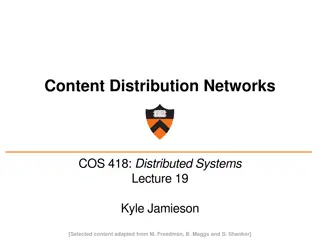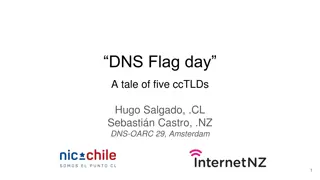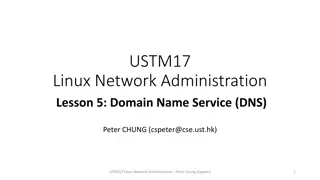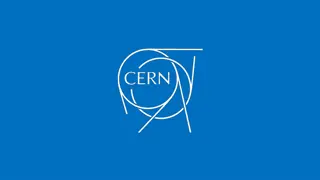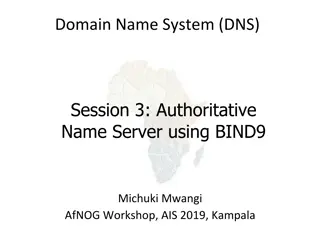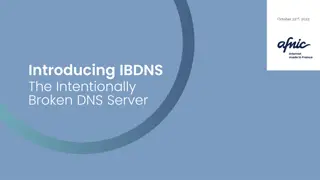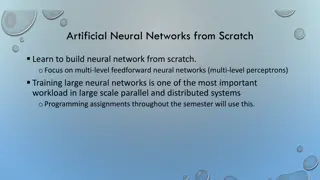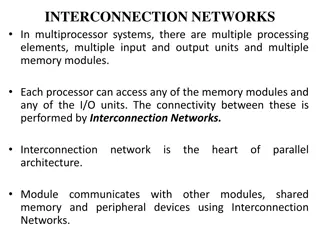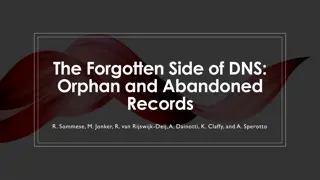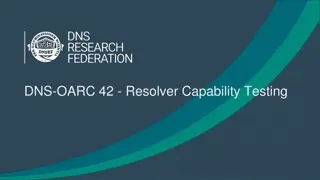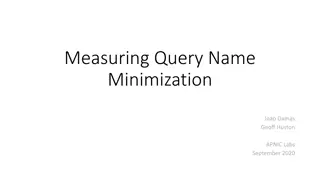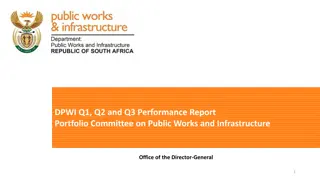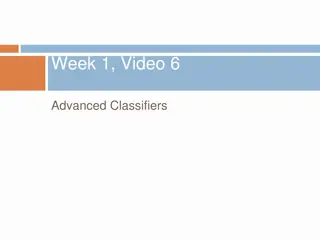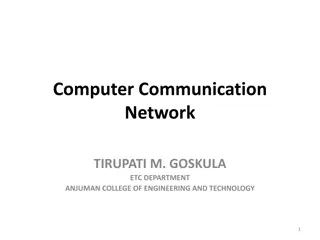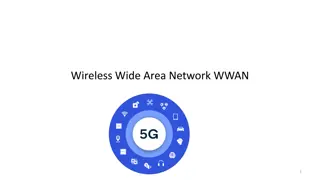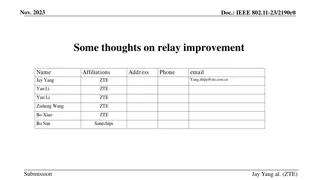Understanding DNS Performance and Issues in Information-Centric Networks
DNS (Domain Name System) plays a crucial role in the Internet and web infrastructure, impacting scalability and content delivery. This content delves into DNS issues, comparing ISP DNS with Google DNS and OpenDNS in terms of latency, caching, and performance with CDNs. It explores how caching, third-party DNS operators, and specialized features like load balancing and phishing protection influence DNS functionality.
Download Presentation

Please find below an Image/Link to download the presentation.
The content on the website is provided AS IS for your information and personal use only. It may not be sold, licensed, or shared on other websites without obtaining consent from the author. Download presentation by click this link. If you encounter any issues during the download, it is possible that the publisher has removed the file from their server.
E N D
Presentation Transcript
Information-Centric Networks Section # 3.2: DNS Issues Instructor: George Xylomenos Department: Informatics
Funding These educational materials have been developed as part of the instructors educational tasks. The Athens University of Economics and Business Open Courses project only funded the reformatting of these educational materials. The project is being implemented as part of the Operational Program Instruction and Lifelong Learning and is co- financed by the European Union (European Social Fund) and national funds.
Licencing These educational materials are subject to a Creative Commons License.
Week 3 / Paper 2 Comparing DNS Resolvers in the Wild Bernhard Ager, Wolfgang M hlbauer, Georgios Smaragdakis, Steve Uhlig ACM IMC 2010. Main point How does ISP DNS compare with Google DNS and OpenDNS? Latency and caching are the main performance factors How do the answers work with CDNs? CDNs use locality info which may be hidden Information-Centric Networks 03b-4
Introduction DNS is a critical part of the Internet and the web Scalability is heavily influence by caching DNS is widely (mis)used to map users to content How well does this work? Third-party DNS operators have emerged ISP DNS does not always work that well However, it works better for CDNs for location info Extensive performance study 50 ISPs in 5 continents and 28 countries Using ISP DNS, Google DNS and OpenDNS Information-Centric Networks 03b-5
Domain name system DNS is a hierarchical distributed database End hosts query caching resolvers If there is no cached result, root servers are queried Root servers redirect to more specific servers Caching is heavily used to avoid starting from the root All responses are cached according to their TTL parameter DNS today is more than it was designed to be CDN load balancing: custom responses that cannot be cached NXDOMAIN catcher: return an ad page instead of an error Third-party DNS providers have emerged OpenDNS offers phising protection and claims better server Google DNS does prefetching and load balancing Information-Centric Networks 03b-6
Measurements DNS performance as seen by end users DNS queries for more than 10000 hosts Measuring response time and TTL Also measuring time to DNS server ISP DNS, OpenDNS and Google DNS servers 60 vantage points in 50 ISPs Two queries per host to examine caching and load balancing Different sets of hosts to query Top5000: most popular from Alexa Tail2000: least popular from Alexa Embedded: hosts with content from Alexa top1000 (3500 total) Two special sets of hosts depending on response Redirected and akamaized Information-Centric Networks 03b-7
Responsiveness What is the latency of DNS replies? It really depends on the ISP A good ISP The ISP s DNS servers are the closest to the client Consistently better than OpenDNS and Google DNS The second query is quicker due to caching A bad ISP The ISP s DNS server are comparable to third-parties The second query does not improve the local ISP OpenDNS and Google DNS work better with caching Results are mixed There are many good, bad and intermediate ISPs Information-Centric Networks 03b-8
DNS deployment How well does caching work in each case? A good ISP The second response is nearly constant time In all cases, caching works well A bad ISP The second response depends It may work well (nearly constant time) It may not work at all (same time as first query) It may work strange (second query slower than the first) The problem is DNS load balancing! The second response may come from a different server This occurs with both ISP and third-party DNS It implies centralized server infrastructure Information-Centric Networks 03b-9
DNS answers How good is the response of the DNS server? Server load balancing and CDNs may lead to different responses CDNs try to locate a nearby server Responses show a lot of diversity 10000 host lookups lead to 36000 different answers! Each query occurs 2x3=6 times How often do you get a server in your ISP? The local DNS usually returns local servers This commonly occurs in ISP hosting CDN servers Especially for the akamaized host set OpenDNS and Google DNS do not return local servers The answer is based on the DNS server address They may even return servers in different continents Information-Centric Networks 03b-10
Conclusions Two things must be considered How well does the ISP manage its DNS? Centralized DNS with load balancing is not good It does not allow caching to work well It is better to use hierarchical DNS servers A good ISP generally outperforms third-party DNS How well do CDNs work with DNS? Quite well with the ISP s DNS servers Quite bad with third-party servers DNS needs to be extended with client IP to handle this This simplifies misusing it of course! Information-Centric Networks 03b-11
End of Section # 3.2 Course: Information-Centric Networks, Section # 3.2: DNS Issues Instructor: George Xylomenos, Department: Informatics


